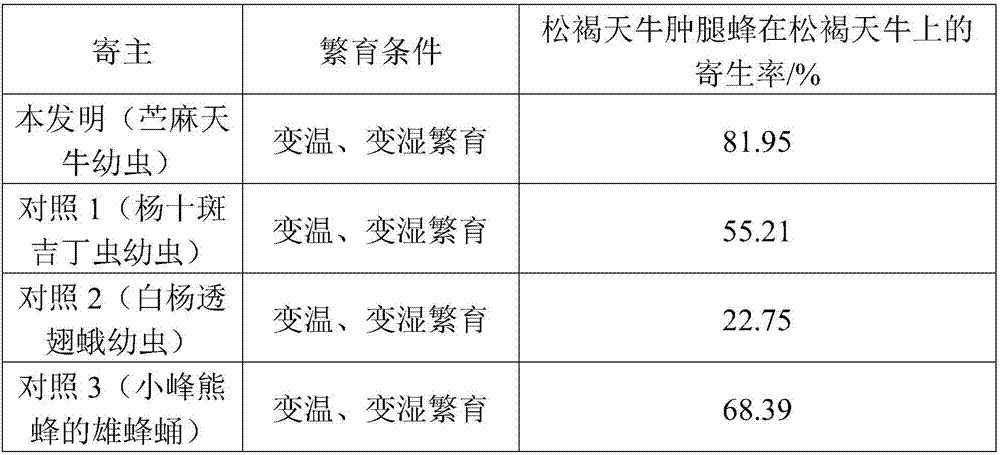Method for artificially breeding sclerodermus and application of sclerodermus in prevention and control of trunk-boring insect pests on forest trees
A technology of monochamus and artificial breeding, which is applied in the fields of application, botany equipment and methods, horticulture, etc., can solve the problems such as weakened vitality of monochamus and unfavorable factory breeding, etc., and achieve the improvement of parasitic ability Effect
- Summary
- Abstract
- Description
- Claims
- Application Information
AI Technical Summary
Problems solved by technology
Method used
Image
Examples
Embodiment 1
[0021] 1. Test method: (test repeated three times)
[0022] (1) Put the larvae of monochamus ramie into the finger-shaped tube, and then insert the healthy and mated female bee of the monochamus monochamus, plug the mouth of the finger-shaped tube tightly with absorbent cotton, The quantity ratio of the female beetle and the ramie beetle larva is 1:2;
[0023] (2) Put finger tube in 23 DEG C, in the artificial climate chamber of 55% relative humidity, cultivate 12 days; Then adjust the temperature in the artificial climate chamber to 27 DEG C, relative humidity 65%, cultivate 25 days, pine brown The swollen-legged beetle begins to emerge, and the swollen-legged wasp after emergence is taken out from the artificial climate box, and then selected and reserved;
[0024] (3) select 15 white plastic boxes of 30cm * 30cm * 20cm for use, all put into 5 sections and be connected with the oak wood section that pine brown beetle larva (1-3 instar) is arranged in every box, breed in the...
Embodiment 2
[0031] Test method: (test repeated three times)
[0032] (1) Put the larvae of monochamus ramie into the finger-shaped tube, and then insert the healthy and mated female bee of the monochamus monochamus, plug the mouth of the finger-shaped tube tightly with absorbent cotton, The quantity ratio of the female beetle and the ramie beetle larva is 1:2;
[0033] (2) Put finger tube in 23 ℃, in the artificial climate box of relative humidity 55%, cultivate 12 days; Then adjust the temperature in the artificial climate box to 27 ℃, relative humidity 65%, cultivate 24 days, pine brown The swollen-legged beetle begins to emerge, and the swollen-legged wasp after emergence is taken out from the artificial climate box, and then selected and reserved.
[0034] (3) select 15 white plastic boxes of 30cm * 30cm * 20cm for use, all put into 5 sections and be connected with the oak wood section that pine brown beetle larva (1-3 instar) is arranged in every box, breed in the step (2) and obtai...
PUM
 Login to View More
Login to View More Abstract
Description
Claims
Application Information
 Login to View More
Login to View More - Generate Ideas
- Intellectual Property
- Life Sciences
- Materials
- Tech Scout
- Unparalleled Data Quality
- Higher Quality Content
- 60% Fewer Hallucinations
Browse by: Latest US Patents, China's latest patents, Technical Efficacy Thesaurus, Application Domain, Technology Topic, Popular Technical Reports.
© 2025 PatSnap. All rights reserved.Legal|Privacy policy|Modern Slavery Act Transparency Statement|Sitemap|About US| Contact US: help@patsnap.com



